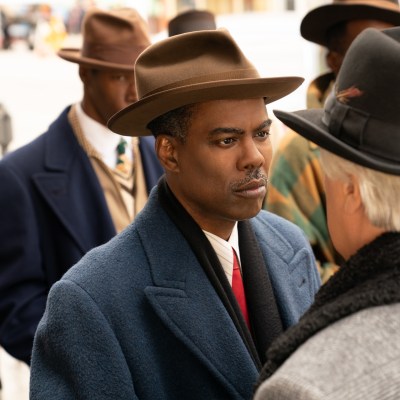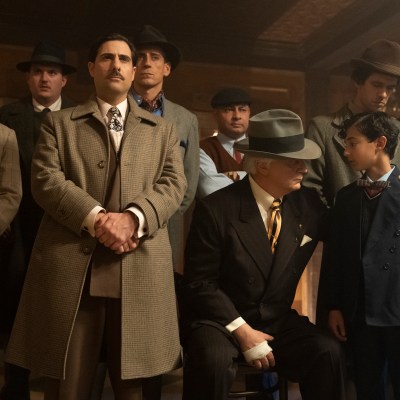Fargo Season 4 Episode 1 Review: Welcome to the Alternate Economy
This Fargo review contains spoilers.
Fargo Season 4 Episode 1
It’s been a long wait for Fargo’s fourth season. Noah Hawley’s improbably good Coen Brothers adaptation arrived on the scene as an idiosyncratic, darkly funny crime story, but in its third season, its Midwest charm and stylish execution couldn’t quite hide the fact that the story was lacking and the schtick was wearing thin. Hawley decided to go back to the drawing board for Season 4, then was forced to delay his return to the anthology series a bit longer due to coronavirus shutting down production. Thankfully, the FX series is back with a new approach, in a new setting, but will the many interesting threads in this new installment coalesce into something worthwhile?
A nearly 25-minute prologue kicks off “Welcome to the Alternate Economy,” simultaneously setting the stage for the 1950 Kansas City gang war between the Fadda Family and Canon Limited and introducing us to this season’s true innocent, Ethelrida Smutny. Ethelrida is an upstanding student and clearly a precocious teen, but that also makes her a target as a black girl in segregated America. Taking cues from Frances McDormand’s role in the original Fargo film, each season of the series always features a morally sound centrical character, but so far, all of those characters have been police officers.
It’s quite the change to have our voice of reason coming from a marginalized character who struggles to have a voice in her own home versus an authoritative lawman. I’m hoping Ethelrida will be given the chance to anchor the story in the way that the Solversons and Gloria Burgle did in the past. It looks like her family is getting into some dangerous waters, borrowing money from the Cannon Limited gang, so we’ll see if Ethelrida can keep her strength of character after drifting into the orbit of some unsavory characters.
In a history report, Ethelrida introduces us to the main concepts and conflict of the season. In the pursuit of the American Dream and equality, several groups considered to be “Others” in the United States fight and kill each other over whatever power that they can grab. A great microcosm of the entire saga can be found in Rabbi Milligan’s story. The youngest son of the Irish Milligan Concern, Rabbi earned his nickname after his father sent him to live with the rival Moskowitz crime family. The families believed that exchanging sons would help them keep the peace, but the Milligan’s taught their boy well, and he helps them infiltrate the Moskowitz compound and wipe them out.
When the Fadda Family become the next immigrants on the block, the Milligan’s offer teenage Rabbi up again in a similar agreement, but this time, the teenager grows jaded about his ruthless family’s willingness to just use him as a sacrifice, and he helps the Fadda Family gain the upperhand. Family head Donatello even goes as far as having Rabbi kill his own father. In the Milligan patriarch’s dying breath, he puts a curse on the Fadda’s and their children, which certainly bodes well for the season, doesn’t it? It’s a brutal origin story for Ben Whishaw’s character and instantly makes him a character to watch.
Now years later, Loy Cannon follows tradition and sends his young son across the aisle to live with the Faddas and vice versa. The leaders of the two organizations are somewhat cordial, but it’s obvious that there’s a lack of respect on both sides despite the African Americans and the Italians being “in the gutter together.” Donatello’s son Justo seems to be the most oblivious to the similarities between the two groups, and just as his father is trying to impart that wisdom on his hot-headed son, a classic Fargo mishap changes the power structure of the Fadda Family forever.
Donatello’s “shooting” is a great sequence. Hawley creates tension by misdirecting you to believe that some black young men passing by pose a threat to the Faddas. He then cuts the tension with Donatello passing some extreme gas, and just when it seems like the coast is clear, a botched BB gun shot pierces Donatello’s neck and sends blood spurting everywhere. The Fadda’s try to get their boss admitted to a nearby, reputable hospital, but a snooty doctor turns them away for being Italian. When they finally get Donatello checked in elsewhere, Justo discriminates against an Asian doctor, not realizing the irony.
The Faddas aren’t the only ones discriminated against. Loy and his righthand man, Doctor Senator, take their ingenious idea for the credit card to Kansas City’s most prestigious bank. Clearly they have a million dollar idea, and Doctor Senator establishes his bonafides by mentioning his degree in Economics from Howard, but the old man sitting across from them immediately dismisses his accomplishments by saying “the Negro school.” He then tells the men that their idea is illogical. It’s a shortsighted observation made with little thought primarily because it’s coming from Loy.
Meanwhile, at the hospital with his father, Justo comes across nurse Oretta Mayflower. Mayflower makes quite the introduction earlier in the episode at the Smutny funeral home, delivering casually racist and offensive observations with a five-point vocabulary while also appearing to ingest drugs. Later, her drug habit is confirmed when she does some lines with Justo. That evening, she heads into Donatello’s room and creepily injects him with a mysterious substance that kills him. It doesn’t appear that Mayflower has any motive for the killing, but it’s obvious this isn’t her first time doing something like this. A Fargo season can’t go by without a malevolent, pure evil character, and with her Minnesota accent and cheery demeanor, Mayflower appears to be that presence.
This is a jam-packed premiere episode that has pacing problems. The crisp, deftly edited intro makes the rest of the runtime lag a bit. Fargo’s signature three-panel split screen appears, but it doesn’t really serve any purpose or demonstrate any real style. I also have concerns about their being too many characters. Key figures like Satchel Cannon, Zero Fadda, and Loy’s wife Buel could hypothetically anchor this season, but they already appear to be being pushed to the margins. I’m glad Fargo has returned, but I sure hope it stays focused.
The post Fargo Season 4 Episode 1 Review: Welcome to the Alternate Economy appeared first on Den of Geek.
From https://www.denofgeek.com/tv/fargo-season-4-episode-1-review-welcome-to-the-alternate-economy/



